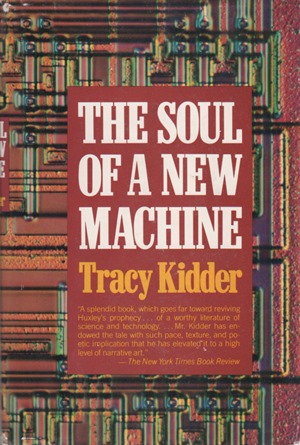lizkat
Watching March roll out real winter
Bumped into a fascinating (and 20-some years old) roundup of "where they are now" in Wired, where the subjects of inquiry were the crew who worked on development of the Data General mini-computer tagged "the Eagle" which in turn was the subject of Tracy Kidder's 1981 book "The Soul of a New Machine."
So yeah we're talking about a 20-yo magazine piece about a 40-yo book. "Slow news day" or not, it struck my fancy so I indulged it. Here's the link for those inclined to glance back anew or for the first time.
 www.wired.com
www.wired.com
That Kidder book was a 1982 Pulitzer prize winner, not least for making a then rather arcane subject something that carpenters and bankers alike may have found readable and interesting, but that the techies of that era either loved or hated, depending mostly on whether their own jobs were compelling or loathsome. It was a time when perhaps only aspiring physicians, hardware engineers and a few rocket scientists (and transplants from there to investment banking) worked such totally crazy hours. Today everyone with a job history that spans more than ten years has stories to tell of all nighters and 100-hour weeks, so the novelty may have worn off more than a bit.
Still (and of course because I remembered that book!) I did read through that Wired piece, which somehow I'd missed at the time, no doubt because I was still working... and then later today I fished out my paperback copy of The Soul of a New Machine itself, which at the time I remember reading "on the clock" during graveyard shifts while waiting for cron jobs to finish running. Speed-reading through it again and finding the ambience as fresh as yesterday, even if tech (not only that of mini computers and Data General itself) have long since evolved to greener pastures.
I think people liked that book because it's wonderful to read about people who love their jobs, pressure-cooker or no, and regardless of field of endeavor. But in particular I've run into other techies who still remember liking Kidder's book, and more than a few have written of their experience of re-reading it.

 auxiliarymemory.com
auxiliarymemory.com
Of course one burns out on all-in efforts like engineering a new chip, a new operating system, a new application, but when one is young and able to keep up the pace, there is still nothing more exciting than being on the cutting edge of a) helping develop something new that's needed and b) doing it up against impossible deadlines. Yeah even today when the bean counters hold the reins and can make it all turn loathsome in the flip of a coin.... until that happens, it's paradise if you love the work.
Here endeth today's prehistoric tech lesson... one that fits other business sectors too.
So yeah we're talking about a 20-yo magazine piece about a 40-yo book. "Slow news day" or not, it struck my fancy so I indulged it. Here's the link for those inclined to glance back anew or for the first time.
O, Engineers!
Twenty years ago, Tracy Kidder published the original nerd epic. The Soul of a New Machine made circuit boards seem cool and established a revolutionary notion: that there’s art in the quest for the next big thing. Nestled into a wicker rocking chair, among his framed maritime charts and...
That Kidder book was a 1982 Pulitzer prize winner, not least for making a then rather arcane subject something that carpenters and bankers alike may have found readable and interesting, but that the techies of that era either loved or hated, depending mostly on whether their own jobs were compelling or loathsome. It was a time when perhaps only aspiring physicians, hardware engineers and a few rocket scientists (and transplants from there to investment banking) worked such totally crazy hours. Today everyone with a job history that spans more than ten years has stories to tell of all nighters and 100-hour weeks, so the novelty may have worn off more than a bit.
Still (and of course because I remembered that book!) I did read through that Wired piece, which somehow I'd missed at the time, no doubt because I was still working... and then later today I fished out my paperback copy of The Soul of a New Machine itself, which at the time I remember reading "on the clock" during graveyard shifts while waiting for cron jobs to finish running. Speed-reading through it again and finding the ambience as fresh as yesterday, even if tech (not only that of mini computers and Data General itself) have long since evolved to greener pastures.
I think people liked that book because it's wonderful to read about people who love their jobs, pressure-cooker or no, and regardless of field of endeavor. But in particular I've run into other techies who still remember liking Kidder's book, and more than a few have written of their experience of re-reading it.

Rereading: The Soul of a New Machine by Tracy Kidder
by James Wallace Harris, Friday, January 6, 2017 I first read The Soul of a New Machine by Tracy Kidder just after it came out in 1981, before it won the Pulitzer and National Book awards in 1982. …
 auxiliarymemory.com
auxiliarymemory.com
Of course one burns out on all-in efforts like engineering a new chip, a new operating system, a new application, but when one is young and able to keep up the pace, there is still nothing more exciting than being on the cutting edge of a) helping develop something new that's needed and b) doing it up against impossible deadlines. Yeah even today when the bean counters hold the reins and can make it all turn loathsome in the flip of a coin.... until that happens, it's paradise if you love the work.
Here endeth today's prehistoric tech lesson... one that fits other business sectors too.
